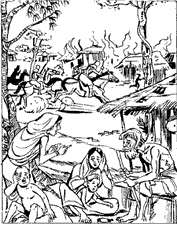|
 When the sepoys rose in revolt in Meerut, they had but one thought in mind — to slaughter all the feringhees and this they did, sparing neither young nor old; male or female. These atrocities were repeated in Delhi, Jhansi, Kanpur and other places. When the sepoys rose in revolt in Meerut, they had but one thought in mind — to slaughter all the feringhees and this they did, sparing neither young nor old; male or female. These atrocities were repeated in Delhi, Jhansi, Kanpur and other places.
The British hit back with a vengeance. General Neill, in his March from Calcutta to Varanasi instructed his men to destroy all places en route. "On they marched for three days," writes Kaye," leaving everywhere behind them as they went, traces of retributory power of the English in desolated villages and corpses dangling from the branches of trees." In Allahabad, "for three months eight dead–carts daily went their rounds from sunrise to sunset to take down the corpses which hung at the crossroads and market places."
Reporting on the atrocities committed in Delhi, the Bombay correspondent of the Times, London, wrote: "No such scene has been witnessed in the city of Shah Jahan since the day that Nadir Shah…directed the massacre of its inhabitants." Kaye agrees: "Many who had never struck a blow against us … were pierced by our bayonets…"
"The system of burning villages," writes Holms, "was in many instances fearfully abused. Old men who had done us no harm and helpless women, with sucking infants at their breasts, felt the weight of our vengeance, no less than the vilest malefactors; and as they wandered from their blazing huts they must have cursed us as bitterly as we cursed the murderers of Kanpur."
The atrocities seen in 1857, writes R.C. Majumdar, "prove, if proof were needed, that the much-vaunted culture of the progressive world is only skin-deep, — whether the skin is black or white, belongs to the spiritual east or materialistic west, to the civilized Europe or backward Asia... Mankind would do well to ponder over this __ that only a very thin line demarcates the human being from an animal."
|

